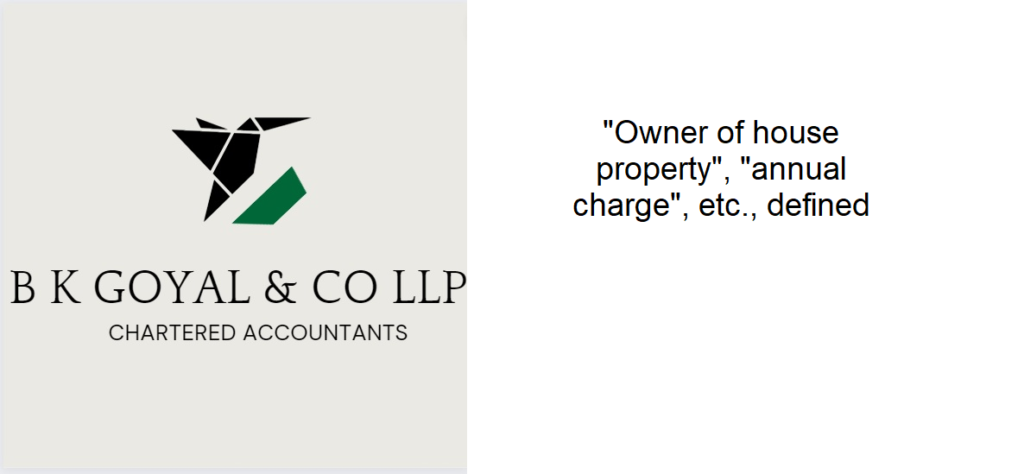In India, the ownership of a property is governed by the Income Tax Act of 1961, which has provisions for taxing income earned by individuals, corporations, and other entities. Owning a house property comes with specific tax implications, and the yearly charge associated with it is defined under Section 27 of the Act. Let’s examine what it entails to be the possessor of a house property and the concept of the annual fee.
The term “owner of a house property” refers to an individual who holds the legal title to a property. This title could take the form of a freehold, leasehold, or any other recognized form of legal ownership. As the owner of the property, one is accountable for maintaining it and paying taxes related to it.
According to the Income Tax Act, a house property is defined as a building or land owned by the taxpayer, which is used for either residential or commercial purposes. The property could be an apartment, house, shop, office, or any other type of building.
Section 27 of the Income Tax Act states that if an individual possesses more than one house property, only one of them is considered self-occupied, and the others are treated as let-out properties. The annual value of the self-occupied property is considered zero, while the annual value of the let-out property is calculated based on the rental income that the property can generate.
The annual fee pertains to the tax imposed on the annual value of the let-out property. The annual value is computed as the higher of the actual rent received or the potential rent that the property can generate. It is crucial to note that the annual value is not equivalent to the actual rent received but is a value deemed to be the rental income that the property can generate.
As an owner of a house property, one can claim certain deductions that can reduce taxable income. These deductions include a standard deduction of 30% of the annual value of the property, which covers expenses associated with maintaining the property. If an individual has taken a home loan to buy the property, they can claim a deduction on the interest paid on the loan, up to a maximum amount of Rs. 2 lakhs per year. Lastly, one can also claim a deduction on the municipal taxes paid on the property.
To avoid legal issues, it is crucial to comprehend the tax implications associated with owning a house property. The annual fee is the tax levied on the annual value of the let-out property, and deductions can be claimed on expenses such as maintenance, interest on home loans, and municipal taxes.
under section 27 of Income Tax Act, 1961
For the purposes of sections 22 to 26—
(i) an individual who transfers otherwise than for adequate consideration any house property to his or her spouse, not being a transfer in connection with an agreement to live apart, or to a minor child not being a married daughter, shall be deemed to be the owner of the house property so transferred;
(ii) the holder of an impartible estate shall be deemed to be the individual owner of all the properties comprised in the estate;
(iii) a member of a co-operative society, company or other association of persons to whom a building or part thereof is allotted or leased under a house building scheme of the society, company or association, as the case may be, shall be deemed to be the owner of that building or part thereof;
(iiia) a person who is allowed to take or retain possession of any building or part thereof in part performance of a contract of the nature referred to in section 53A of the Transfer of Property Act, 1882 (4 of 1882), shall be deemed to be the owner of that building or part thereof;
(iiib) a person who acquires any rights (excluding any rights by way of a lease from month to month or for a period not exceeding one year) in or with respect to any building or part thereof, by virtue of any such transaction as is referred to in clause (f) of section 269UA, shall be deemed to be the owner of that building or part thereof;
(iv) [***]
(v) [***]
(vi) taxes levied by a local authority in respect of any property shall be deemed to include service taxes levied by the local authority in respect of the property.
Services of B K Goyal & Co LLP
Income Tax Return Filing | Income Tax Appeal | Income Tax Notice | GST Registration | GST Return Filing | FSSAI Registration | Company Registration | Company Audit | Company Annual Compliance | Income Tax Audit | Nidhi Company Registration| LLP Registration | Accounting in India | NGO Registration | NGO Audit | ESG | BRSR | Private Security Agency | Udyam Registration | Trademark Registration | Copyright Registration | Patent Registration | Import Export Code | Forensic Accounting and Fraud Detection | Section 8 Company | Foreign Company | 80G and 12A Certificate | FCRA Registration |DGGI Cases | Scrutiny Cases | Income Escapement Cases | Search & Seizure | CIT Appeal | ITAT Appeal | Auditors | Internal Audit | Financial Audit | Process Audit | IEC Code | CA Certification | Income Tax Penalty Notice u/s 271(1)(c) | Income Tax Notice u/s 142(1) | Income Tax Notice u/s 144 |Income Tax Notice u/s 148 | Income Tax Demand Notice
